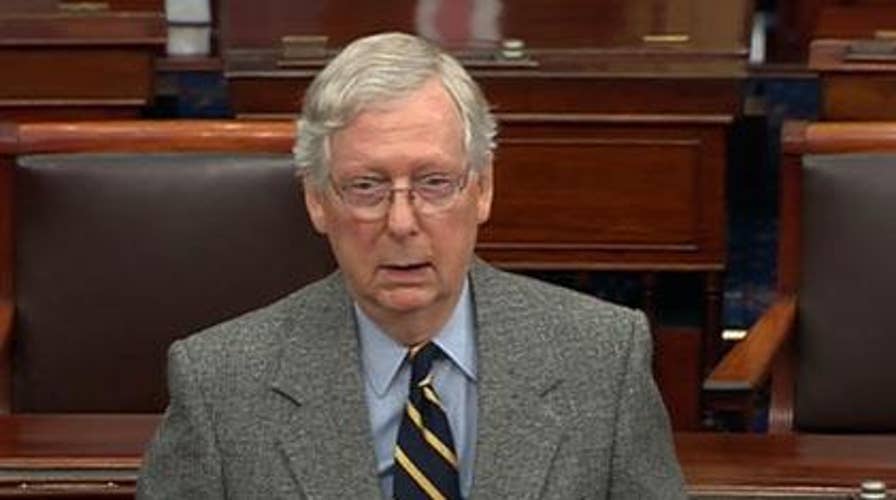Leader McConnell: Trump derangement has morphed into impeachment fever
Senate Majority Leader Mitch McConnell makes remarks on the possible Senate impeachment trial of President Trump
On Jan. 15, 1999, near the end of the second day of the Senate impeachment trial of President Bill Clinton, Impeachment Manager Rep. Bob Barr, R-Ga., made a lengthy presentation during which he referred to the senators in his audience as “jurors” no fewer than six times.
At the close of Barr’s speech, Sen. Tom Harkin, D-Iowa, raised an objection with Chief Justice William Rehnquist, who was presiding over the trial. “I object to the use and the continued use of the word 'jurors' when referring to the Senate sitting as triers in a trial of the impeachment of the president of the United States,” Harkin said.
After a lengthy argument from the senior senator from Iowa, Rehnquist sustained Harkin’s objection. “The chair is of the view that the objection of the senator from Iowa is well taken,” Rehnquist replied, “that the Senate is not simply a jury; it is a court in this case. Therefore, counsel should refrain from referring to the senators as jurors.”
BETSY MCCAUGHEY: ON TRUMP IMPEACHMENT TRIAL, DON'T BELIEVE CHUCK SCHUMER
Not a single senator objected to Rehnquist’s ruling (even though the Senate could have overruled it by a simple majority vote). And no impeachment manager was allowed to refer to the Senate as a jury after Harkin’s objection. The ruling was correct because, according to both the Constitution and historical precedent, senators are absolutely not jurors.
More from Opinion
Article I, Section 3, Clause 6 of the Constitution does state that senators “shall be on Oath or Affirmation” when trying an impeachment. And that oath includes the promise to “do impartial justice according to the Constitution and laws,” similar to the oath taken by ordinary juries.
But Article III, Section 2, Clause 3 specifically sets impeachment apart from jury trials, providing that “The trial of all crimes, except in cases of impeachment, shall be by jury.”
Why does the Constitution specifically separate juries from impeachment?
Because the authors of the Constitution knew impeachment – for good or ill – was an inherently political act. James Wilson, one of the nation’s first Supreme Court justices and one of the principal architects of the Constitution, described impeachment as “confined to political characters, to political crimes and misdemeanors, and to political punishments.”
By its very nature, the Senate’s role in the impeachment process clearly indicates that senators are not passive observers of the trial.
Given the inherently political nature of impeachment, senators neither can nor should set aside political considerations when hearing an impeachment trial. Senators are expected to weigh the best interests of the country in each and every vote and defend the Madisonian institutions of government established by the Constitution from all attacks — including those from politicians who might seek to oust a sitting president over policy disagreements.
CLICK HERE TO SIGN UP FOR OUR OPINION NEWSLETTER
By its very nature, the Senate’s role in the impeachment process clearly indicates that senators are not passive observers of the trial. The Constitution gives the Senate the sole power to set its own rules. Under the Senate’s long-established impeachment rules, senators decide what evidence should be heard, how it should be presented and what witnesses should (or should not) be called. They can even override the presiding officer, who in the case of a presidential impeachment is the chief justice.
No jury can do that.
Juries also are expected to be ignorant of the facts of a case before they hear it, and they are generally precluded from serving if they know each other or the defendant. Again, the Senate possesses none of these attributes of a jury.
CLICK HERE TO GET THE FOX NEWS APP
In Federalist 66, Alexander Hamilton argued that dividing the power of impeachment and removal between the House and Representatives and the Senate would “guard against the danger of persecution, from the prevalency of a factious spirit” in either chamber.
Considering how deeply divided our nation is, there can be little doubt that a “factious spirit” is driving this impeachment. It was both prescient and providential that our founding fathers saw fit to guard against this by placing the final say on conviction and removal not in the hands of the House of Representatives, a court, some specialized tribunal, or even a jury, but in the Senate. We, therefore, must not confuse the role of a jury with that of the Senate in an impeachment trial.









































